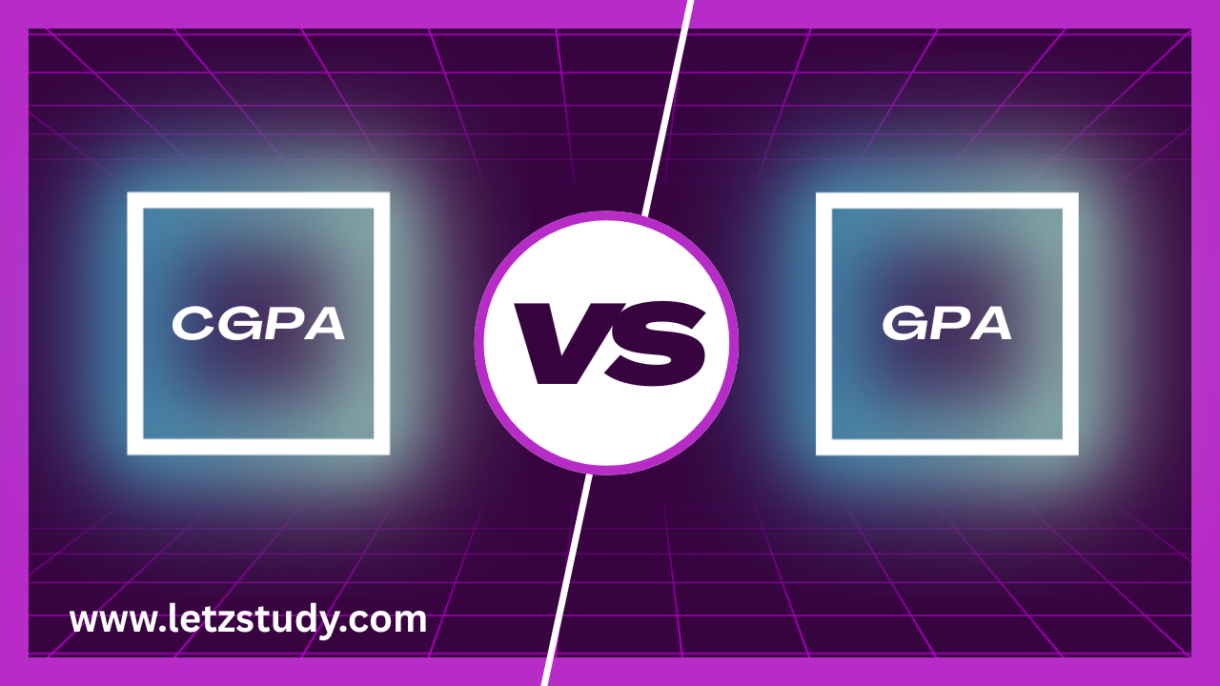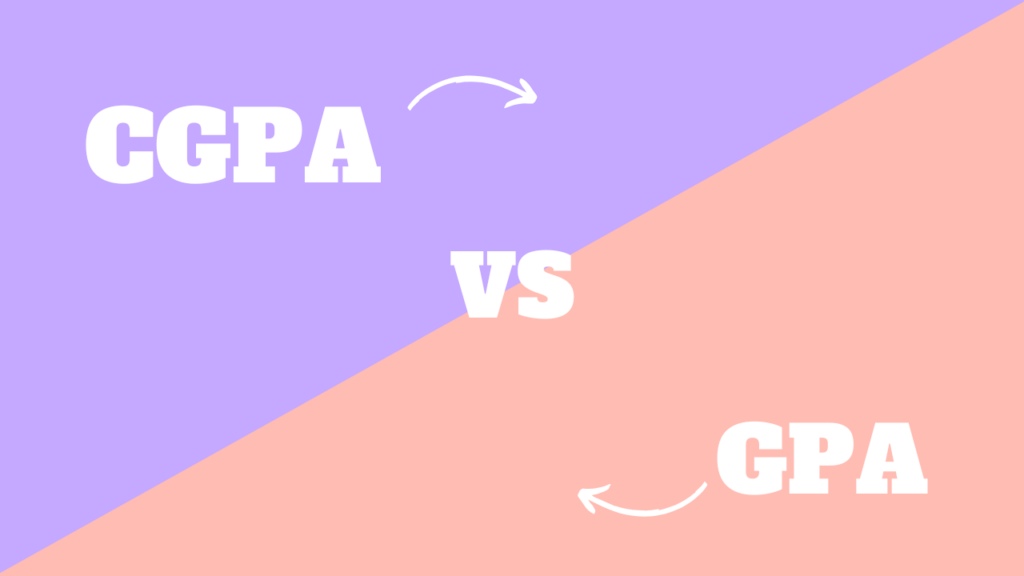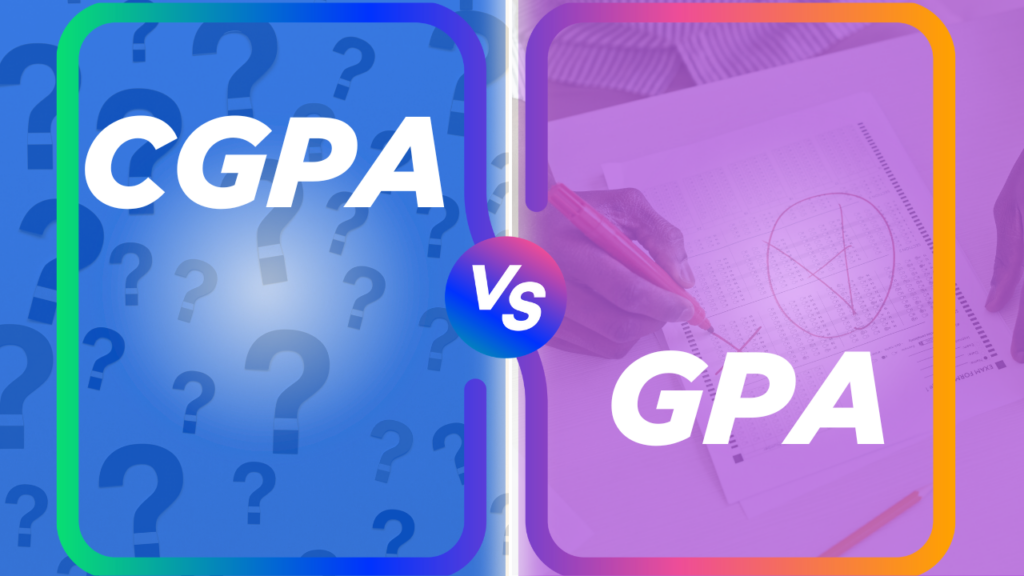
What’s the Difference Between CGPA and GPA?
Knowing CGPA instead of GPA is vital if you are contemplating studying abroad. All universities utilize different grading scales, and knowing what your score means can be crucial to your application.
What is CGPA?
The CGPA (Cumulative Graduation Point Average) is a grading system widely utilized in India and other countries. It is the average of your semester grade during your education, usually on a 10-point scale or 4 points in certain instances.
How is CGPA Calculated?
- Points of Grade awarded for all subjects
- Separated by the number of subjects
Example:
If your grade point for eight subjects is 72, your CGPA is 72/8 = 9.0.
What is GPA?
GPA (Grade Point Average) is the preferred grade scale used in countries like the USA, Canada, and Australia. It is the measure of performance of a semester or academic year, usually on a 4.0 rating.
GPA Calculation Example
- Every subject has a grade (A, B, C, etc.)
- Each grade is one point (A = 4.0, B = 3.0, etc.)
- The average of all points is the GPA
Converting CGPA to GPA: What You Need to Know
The majority of universities have students with their personal conversion requirements. However, a standard formula is:
GPA = (CGPA / 10) x 4
Example of a CGPA:
If your CGPA is 8.5, your estimated GPA would be (8.5 / 10) x 4, which is 3.4.
However, some universities, such as Harvard, MIT, or Stanford, might use different conversion methods.
Why Does CGPA and GPA Matter for Studying Abroad?
The impact of your CGPA or GPA directly affects:
Universities Acceptance
Top-tier universities offer minimum GPA standards (e.g., 3.0-3.5 for US universities).
Scholarships
Many scholarships require a good GPA or CGPA.
Visa Approvals
Some student visas consider your academic performance.
CGPA and GPA Requirements for Popular Study Abroad Destinations
USA
- The majority of institutions will require a GPA of 3.0+ (equivalent to 7.5+ CGPA on a 10-scale)
- Ivy League schools demand a GPA of 3.7+ (CGPA 9.0+)
Canada
- Bachelor’s degrees: GPA 2.5+ (CGPA 6.0+)
- Master’s degrees: GPA 3.0+ (CGPA 7.5+)
UK
- 2 degrees equivalent CGPA 7.0+ (or GPA 3.2+)
- Oxbridge demands higher scores
Australia
- The minimum GPA 2.5-3.0+ (CGPA 6.0-7.5+) for top universities
Germany
- Most public universities have requirements for a CGPA of 7.5 or more.
How to Improve Your CGPA and GPA for Study Abroad
- Focus on High-Impact Subjects
- The subjects that have higher credit scores influence GPA more. Choose areas that earn the most credits.
- Retake Low-Grade Courses (If Possible)
- Some universities let you repeat subjects to increase your GPA.
- Engage in Extra Credit Work
- International institutions may offer extra credit opportunities for your work.
- Learn from Professors
- Their knowledge can boost your academic success.
- Improve Time Management
- Good study habits lead to more marks, and GPA improves.
6 Common Causes of CGPA vs GPA Problems in Abroad Studies
1. Strict Grading Systems
- Many foreign universities offer a higher level of difficulty than students are used to.
- Solution: Understand the grading system prior to applying and aim for a strong academic track record.
2. Cultural & Academic Adjustment
- Moving to a brand-new educational system can be challenging.
- Solution: Take part in orientation sessions, ask for study help, and engage with professors.
3. Language Barriers
- If English is not your first language, coursework can be intimidating.
- Solution: Take proficiency tests seriously and practice communication skills.
4. Time Management Issues
- Balancing study, work, and social engagements may affect academic achievement.
- Solution: Use planners and seek academic help when necessary.
5. Homesickness & Mental Health Struggles
- Absence from family may affect focus.
- Solution: Stay connected with family, engage in group activities, and talk to counselors if needed.
6. Course Selection Mistakes
- Choosing the wrong courses may impact your grades.
- Solution: Consult academic advisors and select courses that align with your strengths and ambitions.

13 Tips to Improve Your CGPA and GPA
1. Set Clear Academic Goals
Set GPA goals for each semester. Achievable targets keep you focused.
2. Stay Organized Using Your Study Planner
Use planners and digital apps like Google Calendar to manage deadlines and tasks.
3. Prioritize Time Management
Utilize techniques like Pomodoro or the 20/20 rule to maximize efficiency.
4. Attend Lectures and Participate Actively
Engage in class discussions, take thorough notes, and ask questions.
5. Develop Effective Note-Taking Skills
Methods like Cornell Notes and mind mapping can help organize thoughts quickly.
6. Study Smart, Not Just Hard
Use Active Recall, spaced repetition, and testing exercises to consolidate concepts.
7. Utilize Online Learning Resources
Platforms like Khan Academy, Coursera, and YouTube can enhance your understanding.
8. Seek Help When Needed
Reach out to tutors or study groups if you’re struggling.
9. Maintain a Balanced Study Routine
Don’t cram—create a study schedule for assignments and revisions.
10. Stay Healthy for Better Focus
Eat healthily, exercise, and get enough sleep (7-8 hours) for better focus.
11. Avoid Academic Burnout
Take breaks, engage in hobbies, and practice mindfulness to relieve stress.
12. Improve Your Writing Skills
Use tools like Grammarly and Purdue OWL to enhance essay quality.
13. Review and Reflect on Your Progress
After each semester, evaluate your strengths and weaknesses and adjust study strategies accordingly.
Key Differences Between CGPA and GPA
Both CGPA and GPA evaluate academic achievements, but they differ in how they are calculated and their range of application.
GPA
GPA evaluates academic progress over the course of a single period or semester.
CGPA
CGPA provides an average GPA score for the entire duration, reflecting academic achievement throughout the semester or program.
Minimum CGPA Requirements for Studying Abroad
Admission requirements vary depending on the country, institution, and program. Here’s a general overview:
United States
A minimum CGPA of 3.0 on the 4.0 scale is typically required for master’s degrees. Top universities may require a 3.5 GPA or higher.
Canada
Undergraduate programs generally require a CGPA between 2.7 and 3.0, while postgraduate programs may have a requirement of 2.5 to 3.0.
Australia
The standard is a CGPA of 6.0 on a 10-point scale, which applies to both undergraduate and postgraduate courses.
Impact of Study Abroad on Academic Performance
Research shows that participating in study abroad programs is linked to better academic outcomes. According to the Consortium for Analysis of Student Success through International Education (CASSIE), students who studied abroad had higher GPAs after their program, showing an increase of 0.10 to 0.11 points.
Case Study: CGPA Requirements for MS Programs in the USA
Understanding the CGPA requirements is crucial for Indian students seeking to pursue a Master of Science (MS) degree in the USA.
CGPA Conversion
Indian universities typically use the 10-point scale, whereas U.S. universities use the 4.0 scale. Convert your percentage to CGPA by dividing it by 100 and multiplying by 4. For example, a 75% equals a 3.0 GPA.
Admissions Criteria
Top-ranking schools may require a CGPA of 3.5 or higher, while others may accept a CGPA of 3.0. For students with lower CGPAs, high test scores or relevant work experience can strengthen their application.
Expert Opinions and Influencer Insights on CGPA and GPA
Education consultants emphasize that while GPA/CGPA is important, holistic assessments also matter. Here’s what experts recommend:
Dr. John Richardson, International Admissions Director at Global University
“Your CGPA/GPA plays a crucial role in studying abroad, as it reflects your academic consistency. However, many universities also consider other factors, such as research experience, extracurricular activities, and a strong statement of purpose.”
Sarah Patel, Education Consultant & Study Abroad Advisor
“While a high CGPA can strengthen your application, students with lower GPAs can still get accepted by highlighting their unique strengths. Strong recommendation letters, relevant work experience, and compelling personal statements can make a big difference.”

How LetzStudy Helped Students Achieve Their Dream of Studying Abroad Despite CGPA/GPA Challenges
Ananya R P’s Success: From Low CGPA to Top UK University
Ananya’s CGPA of 6.5/10 seemed like a setback in her goal to pursue a Master’s in Business Analytics in the UK. LetzStudy guided her toward universities with a holistic admissions process. After expert guidance, Ananya secured admission to Brunel University London.
Lesson: A low CGPA doesn’t mean the end. A strong profile and strategic application can open doors.
Rohan Babu’s Journey: Converting Indian CGPA to USA GPA
Rohan had concerns about converting his 7.8 CGPA to the U.S. GPA scale. LetzStudy provided accurate conversion guidance and helped him prepare a strong SOP. Today, Rohan is studying at Arizona State University.
Lesson: Proper CGPA-to-GPA conversion ensures clarity and better application chances.
Priya D’s Strategy: Overcoming a Low CGPA with Strong GRE & SOP for Canada
Priya’s GPA of 6.2 didn’t deter her from applying for a Biotechnology degree in Canada. LetzStudy helped her strategize for a higher GRE score and a compelling SOP. Priya was admitted to York University with a partial grant.
Lesson: A low CGPA can be overcome by focusing on other areas like GRE, SOP, and relevant experience.
How CGPA and GPA Affect Your Study Abroad Journey
Your GPA/CGPA significantly impacts:
- University Admissions: Top universities often set minimum GPA requirements (e.g., 3.0 on the 4.0 scale in the U.S.).
- Scholarship Eligibility: Many scholarships require a CGPA or GPA of 3.5 or higher.
- Visa Processing: A strong academic track record can strengthen your student visa application.
- Job and Internship Opportunities: Companies consider academic achievements during hiring.
- Credit Transfer and Course Exemptions: Your GPA can determine eligibility for credit transfers.
Converting CGPA to GPA and Vice Versa
Each country uses different grading scales. Here’s how you can convert:
- India (10-point scale) to USA (4.0 scale): Divide CGPA by 10, then multiply by 4.
- UK (Percentage System) to GPA: A 70%+ is typically equivalent to a 4.0 GPA.
- Canada (4.33 scale): Some Canadian institutions use a 4.33 scale instead of the 4.0 scale.
Example: A CGPA of 8.5 on a 10-point scale equals 3.4 on the 4.0 scale.
Challenges in Meeting GPA Requirements
- Different Grading Systems: A high CGPA in one country may not translate into a high GPA elsewhere.
- Competitive Universities: Ivy League and top universities typically require a GPA of 3.7 or higher.
- Course Rigor Variations: Some courses may have grading systems that differ from those in your home country.
- Documentation and Proof: Universities may require official transcripts and conversion tables.
How to Improve Your CGPA and GPA for Abroad Study
- Prioritize Key Subjects: Focus on subjects relevant to your study abroad program.
- Take Extra Coursework: Some universities value additional courses for improving academic standing.
- Time Management: Avoid last-minute studying; consistent effort matters.
- Seek Help: Study groups or tutoring can be beneficial.
- Maintain a Consistent GPA: Consistency is key, rather than fluctuating grades.
Your CGPA or GPA is crucial for admission to universities and securing scholarships to study abroad. Understanding how these grades work and how to convert them can make a significant impact on your application.
Book a Free Consultation with LetzStudy
LetzStudy can help you navigate the complexities of GPA and CGPA conversion, and guide you to your dream study destination!
For more information, connect with us on LinkedIn and for daily updates, follow us on Instagram
*Universities regularly update their fees, eligibility, and policies. While we aim to keep this content accurate, readers should always check official sources for the latest information.

